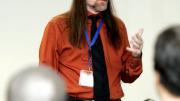In case you missed it, the June 22 New Yorker had a fascinating article about a John Jay College of Criminal Justice professor's radical approach to solving gang violence. And that professor has Harvard ties: from 1993 until 2004, he was a senior researcher and adjunct professor in the Harvard Kennedy School (HKS) program in criminal justice policy and management.
Author John Seabrook paints David Kennedy as an intriguing figure, noting that he studied moral philosophy at Swarthmore College and worked as a freelance science writer in Boston before taking a job writing case studies at HKS—a job that ignited an interest in criminal justice that would form a vocation. Seabrook writes: "...his lack of formal schooling in either the practice or the theory of crime control may be his strongest qualification for the job."
Kennedy broke with the orthodoxy of zero-tolerance policies, espousing an approach more preventive than punitive. Developing this approach in the mid 1990s, he took his cues from a successful program being run by the Boston Police Department's Youth Violence Strike Force. Hallmarks of the approach include participation from leaders in the communities where the violence is taking place—to offer both deterrence (informing young men about the consequences of gang involvement) and support (in the form of actual jobs, not just training or counseling).
The article focuses in particular on Cincinnati, where police, with Kennedy's cooperation, have used social-networking software to target key gang members for arrest. And it paints a nuanced picture of fighting crime as a two-steps-forward, one-step-back endeavor, detailing some setbacks and quoting Kennedy's critics.
For background, see David Kennedy's faculty page or the homepage for the HKS program in criminal justice policy and management.









